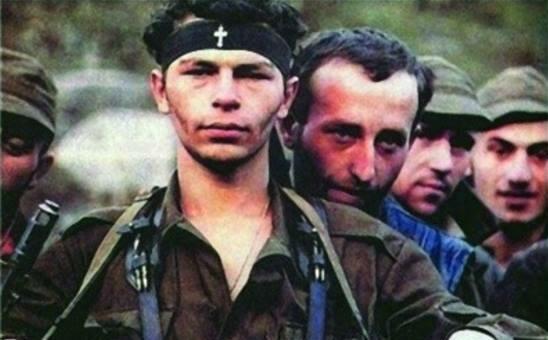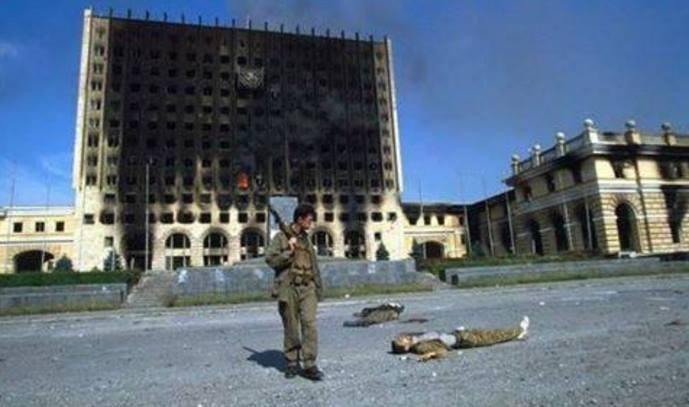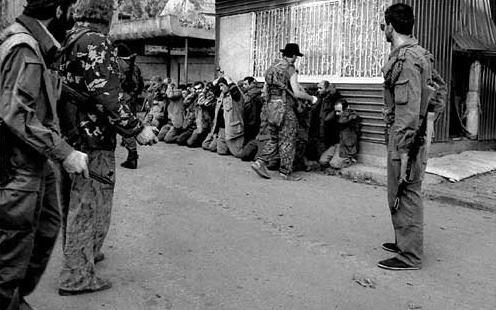Georgian analyst on future of Caucasus Caliber.Az interview with Georgian analyst
Caliber.Az presents an interview with Georgian analyst, historian, and Doctor of Economics Vazha Kakabadze.
- Mr. Kakabadze, you specialize in historical crimes of Armenians in the South Caucasus region, among other things. I would like to know your opinion: who, in your opinion, was the main culprit of the war in Abkhazia and South Ossetia, and what is the role of Armenians in it?
- These wars were provoked by Russia. In addition to Moscow, Yerevan also played an extremely negative role in the Russian-Georgian war. Well aware of the strategic importance of Abkhazia, the Russian Federation sought to relocate its Muslim population to Turkey, which, in its opinion, could contribute to the establishment of political stability in the province. Thus, the expulsion of the Apsua living in Abkhazia (self-designation of Abkhazians - ed.) started. Armenian migration to Abkhazia began at the end of the XIX century. In October 1879, the first group of Armenians from the Trabzon Vilayet of the Ottoman Empire landed on the Pitsunda coast.
During the war in Abkhazia in the early 90s, the Armenians secretly formed the Baghramyan battalion headed by commander Vagharshak Kosyan on its territory. They killed, tortured, cut off the heads of Georgians, and played football with their heads. Moreover, they caught up with fleeing Georgian refugees in Kodori and staged a massacre at the entrance to the gorge. The Armenian militants are responsible for the martyrdom, torture and burning alive of hundreds of civilians. The Armenian government has not yet given an official assessment of the criminal acts of the Baghramyan battalion.
On November 23, 1993, on a wonderful holiday for Georgians, St. George's Day, it was the Armenian battalion of Baghramyan that attacked the villages of Omarishara and Sakeni in the Kodori Gorge and drowned them in a sea of blood. For the mass slaughter of the peaceful Georgian population in Gali, "Baghramyan" people were presented with various awards. Twenty members of this battalion were awarded the title "Hero of Abkhazia".

An excerpt from the memoirs of an Armenian soldier of the battalion was published in the Georgian newspaper Saerto Gazeti. He told how the Armenians were able to get hold of weapons, which were then used to kill civilians: "The Georgians trusted us, the Armenians living in Abkhazia, so I took a three-liter bottle with diluted alcohol and penetrated into the camp of Georgian soldiers. When they had drunk alcohol and fell asleep, I led the fighters who had been warned in advance to the camp. We took the machine guns of the Georgians and shot them, none of them even woke up. Then we collected ammunition and returned back. That's how the local Armenians got their first combat weapon."
Back in 2006, a Georgian writer of Abkhaz nationality, Sergi Sajaia, described the atrocities of the Baghramyan servicemen: "Georgian servicemen or civilians who were captured were tied to a tree, tires were put on their heads and burned. How many women were raped. In the village of Yashtkhva, one Georgian woman was trapped and hid in an Armenian family. So they turned her over to the executioners. The entire battalion raped her, and she went crazy."
This is what the witness Nodar Natadze says: "Baghramyan's battalion committed many brutal crimes. The war was already over when Georgian partisans captured an Armenian. He started crying and wailing. The Georgians felt sorry for him and were about to release him, but they saw a package on his chest. They opened it and found eyes torn out from the Georgians, ears and nose cut off. He turned out to be a member of the Baghramyan battalion. Abkhazians were paying Armenians a hundred dollars for each killed Georgian and as a proof, they had to show some organ of the killed".
Another eyewitness German Beselia testifies: "Many people didn't want to leave their homes. Some had bed-ridden patients at home. An Armenian group entered the village of Merkheuli. When they started shooting the Georgian population, my neighbor managed to hide in a haystack. Armenians noticed it, tied the haystack tightly with a rope and set it on fire. An old woman's head was cut off with an axe in front of the entire village... That's how brutally they were treating Georgians."
Total of 200 volumes of materials from the Prosecutor General’s Office of Georgia evidence the “deeds” of the bandits led by a certain Trapizonyan. It is hard to believe that these crimes were committed in the 20th century, after the horrors of Auschwitz, Treblinka and Dachau. Maybe that's why Hitler considered Armenians "Aryans"?
- Why did Armenians in Abkhazia show such monstrous cruelty towards Georgians? Maybe because of their territorial claims against Georgia?
- Armenians' plans at all times included the appropriation of Georgian lands and the western coast of the Black Sea. For this purpose, an important stage was the seizure of Orthodox churches and the destruction of mosques.
There are numerous examples of Armenians trying to erase and destroy traces of Georgian origin on Georgian churches and monasteries, to scrape or erase Georgian inscriptions from the stones, to remove the stones themselves from buildings and replace them with others with Armenian inscriptions. Even Russian and Georgian newspapers wrote about it.
As communications of global significance and integration ties between Azerbaijan, Georgia, Turkey and Ukraine developed in the South Caucasus, the destructive forces of Armenian separatism became more active. Finding themselves isolated because of the temporary occupation of Azerbaijani territories, the adherents of the idea of Armenian nationalism and its derivative, aggressive separatism, tried to hinder the implementation of international projects.
Moreover, the edge of aggression in different forms is directed not only against Azerbaijan but also against Georgia as a full member of the processes of creation of common peaceful space, cooperation from the Caspian Sea to the Aegean Sea. In order to break the self-isolation and harm the neighbors (Azerbaijan and Georgia), the Armenian nationalists promoted the idea of "corridors" through the territory of Georgia, where Armenians live. Their goal is not only for economic gain, but also to cause maximum damage to Azerbaijani-Georgian relations.
Armenian nationalism operates according to the principle "the worse for Azerbaijani-Georgian ties, the better for Armenia. Against this background, there is information about the return to Georgia of fighters from the Armenian terrorist organization ASALA, which seemed to have completely disappeared back in the 1980s. However, as it turns out, it has only been put into "hibernation" mode.
In the Javakheti region of Georgia, where Armenians live compactly, the extremist organization "Virk" supporting the separation of this region from Georgia is gradually becoming active. In exchange, Georgia is offered the same Georgian-Armenian "corridors" and the opening of the transport corridor through Abkhazia and the Tskhinvali region. It is now clear to whom, apart from Russia, the war in Tskhinvali was beneficial.
Armenia has always insisted on opening railway traffic through Abkhazia and automobile traffic through the Tskhinvali region. However, Georgia has so far paid little attention to these claims, developing relations with Azerbaijan. Economic cooperation with Azerbaijan is much more interesting for Georgia than with Armenia.

Armenian nationalism acts according to the principle that "the worse for Azerbaijani-Georgian ties, the better for Armenia." Against this background, information appeared about the return to Georgia of fighters from the Armenian terrorist organization ASALA, which seemed to have completely disappeared back in the 1980s. However, as it turns out, it has only been put into "hibernation" mode.
In the Georgian region of Javakheti, where Armenians live compactly, the extremist organization "Virk" is gradually becoming more active, advocating the separation of this region from Georgia. In exchange, Georgia is offered the same Georgian-Armenian "corridors" and the opening of the transport corridor through Abkhazia and the Tskhinvali region. It is now clear to whom, apart from Russia, the war in Tskhinvali was beneficial.
Armenia has always insisted on opening railway traffic through Abkhazia and automobile traffic through the Tskhinvali region. However, Georgia has so far paid little attention to these claims, developing relations with Azerbaijan. Economic cooperation with Azerbaijan is much more interesting for Georgia than with Armenia.
The Armenian lobby is doing everything to eliminate the very raising of the question of the return of Abkhazia to Georgia and the return of Georgian refugees. The Armenians did not play out "geopolitical combinations" that actually put Abkhazia under Armenian control in order to give up this land now.
We should pay attention to another fact: in 1977, ethnic Abkhazians in Gagra were a tiny minority. Armenians were the largest ethnic group there. The Armenians did not become the majority in Gagra by accident either. In his speech in 2018, Araz Alizadeh, a member of the Milli Majlis, and Chairman of the Social Democratic Party of Azerbaijan, noted: "In the 60s, an Armenian Garanyan became the first secretary in the city of Gagra. He immediately started relocating Armenians there. And they started settling compactly in the city, one street is still called Garanyan Street."
Having practically occupied Gagra by the beginning of the 70s and having become a majority here, they decided not to stop there and set a goal to make the entire Abkhazia "Armenian". For this, they needed to put brotherly Abkhazian and Georgian peoples at odds and separate Abkhazia from Georgia. It turns out that it was Armenians that started the separatist movement for the "independence of Abkhazia" in Gagra in the seventies of the last century. Of course, not for the "good of Abkhazians" but for their own, Armenian interests. The origin of separatism and its foundation is a letter (addressed to the Kremlin), written by a man living in Donetsk. In this letter, he demanded the secession of Abkhazia from Georgia. The author of the letter was an Armenian Yesian Esayants living in Donetsk. In the very Donetsk, which by some wicked irony of fate today is the "capital" of the unrecognized separatist "DPR".
Thus, the impetus for the Abkhazian separatism was given more than 40 years ago by ethnic Armenian Esayants - the author of the provocative letter. Of course, he did not act alone. He was backed by a powerful Armenian lobby, which at the time already seemed to be planning ethnic cleansing in the Caucasus in the interests of Armenia and Armenians. It should be reminded that all this was long before the Karabakh conflict. Armenian nationalists began "dividing Georgia alive" in their interests even before they formulated their territorial claims against Azerbaijan. Therefore, there is no need to be surprised by the hatred of Armenian nationalists towards Georgia and the fact that Armenia regularly votes at the UN General Assembly against the return of Georgian refugees to Abkhazia, where the majority of the population are Armenians, who have thus "achieved their own" and now fully control the economy of the separatist territory.

- At the same time they accuse Turkey of "genocide"...
- There are many documents that show that the Ottoman Empire is not to blame for what happened to the Armenians, but the Armenian terrorists are primarily to blame. The isolated incidents during the deportation of Armenians from the front-line zone to Syria can in no way be compared with the atrocities Armenians committed against the non-Armenian population, who received such an opportunity "under the protection of Russian bayonets". Today, more and more terrible testimonies of the Armenian atrocities in Eastern Turkey in 1916-1918, when the Russian army occupied this territory, are discovered.
At the same time, not only Turkish civilians suffered from the Armenian terror and mass murders organized by the Armenian fighters but also other nations, in particular Circassians, Arabs and Georgian Muslims (the Lazs, Adjarians, the Shavs, Imerkhevs, etc.). During the Soviet period, the facts of the destruction of the Adjarian villages by the Armenians were deliberately suppressed and the relevant documents were destroyed in order not to contradict the official myth "about the friendship of the Armenian and Georgian peoples". This was the most natural genocide of the unique Georgian ethnic community.
If Hitler and his Armenian companion Garegin Nzhdeh had been alive, they could have seen the embodiment of their ideas in the South Caucasus. To be more exact - in Armenia and previously occupied Azerbaijani Karabakh, in Samachablo (where they killed Ossetians in Georgian military uniform) and separatist Abkhazia.
Both here and there Armenian nationalists, Ossetian and Abkhaz separatists carried out unprecedented genocide and ethnic cleansing of the peaceful Azerbaijani and Georgian population.
- What measures is the Georgian government taking today to restore the territorial integrity of the country?
- We have long lived and coexisted together with the Abkhazians. Abkhazian culture and nation are Georgia's part. There is great resentment against Russia in Abkhazia, which is growing. The Abkhazians have already realized that Russia has deceived them because it does not help them economically.
As for South Ossetia, I want to reproach my government based on the fact that this name was invented during the USSR. The real name of this region is Samachablo. Our government supports the policy of peaceful resolution of this conflict and wants to prove that there is no aggression from Georgia neither in Abkhazia nor in Ossetia. The Abkhazians have already understood this, but the Ossetians find it difficult to understand.
- How do you see the future of the Caucasus region?
- Everything depends on the outcome of the war in Ukraine. However, it is related not only to our region. In my opinion, if the Russian-Ukrainian war continues, there will be unrest in Kazakhstan as well.
- Recently President Ilham Aliyev proposed the format of regional cooperation between Georgia, Azerbaijan and Armenia. How do you see the prospects for this format and how will it differ from the "3+3" format?
- Georgia is in full solidarity with Azerbaijan on this issue. However, much depends on the actions of Armenia. If communication processes begin to develop in the South Caucasus, then Russia will remain on the sidelines.








